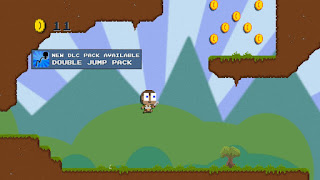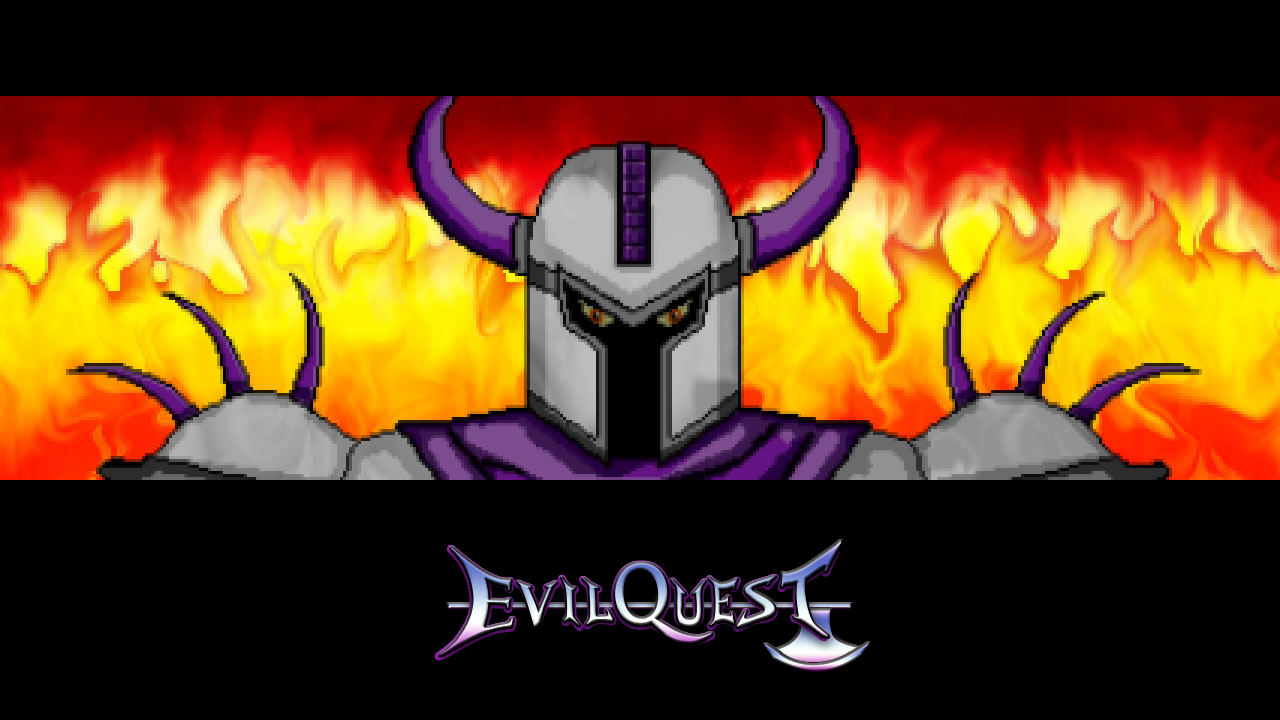Trials by Fire is a column from D. Bethel whereby two game demos are arbitrarily judged and one is declared the victor. The demos discussed below are DLC Quest and EvilQuest.
With so many firmly folded into the world of Skyrim right now (including your humble author), a snobby consumer of video games can’t help but stand back and marvel at what Bethesda’s newest Elder Scrolls entry does for the genre of role playing games, much less gaming itself. Without diving fully into the rhetoric of Skyrim, it should only be said that the game isn’t just an improvement over the previous installment but actually moves the genre forward, creating new rules and expectations that fully challenge the audience while also fully examining the culture from which it was birthed. In fewer words, part of what makes Skyrim great is that it both says and does something about gaming, a post-modern allegory without the winking irony. While the desire to invert traditional gaming expectations has been the focus of many games in recent years, there are a variety of ways to approach this approach, so to speak, as illustrated in Going Loud Studios’ DLC Quest and Chaosoft Games’ EvilQuest.
Both game trials investigate the idea of role within a video game. While many modern games believe the road to complete immersion lies with a binary (nigh arbitrary) skew on morality and choice (re: Bioware), DLC Quest bypasses that and, perhaps, more effectively blurs the line between the player and protagonist than even many triple-A titles. Despite the protagonist being super-deformed and miming the look of an 8- or 16-bit game of old, the demo does its best to show that, as far as this game goes, the term “player character” is a literal and important idea. Instead of relying on the player’s humanity to create a connection with the character being controlled, DLC Quest instead relies on something a bit more honest within the realm of gaming: the player is a consumer.
 |
| Believe it or not, this is you. |
As a gamer might do, the progression of the protagonist rests on the player’s ability to gather money in order to buy DLC (not real downloadable content, but in-game instances called “DLC”) that allow for narrative and character progression. This idea encompasses everything, from the basic expectations (such as having background music and sprite animation) to the esoteric (like speeding up the learning process when acquiring a sword or even the infamous “horse armor” which still does nothing). In the guise of a retro-styled platformer, DLC Quest manages to create a tongue-in-cheek and scathing comment on current trends in gaming by setting up two metaphorical mirrors: one focusing on the players, appealing to our consumerist drives rather than our ability to be sensible, rational human beings; one focusing on gaming itself, wagging a disapproving finger at how petty the business has become.
 |
| The game of your life. |
Whereas DLC Quest does its subversion out in the open as a vaudevillian meta-quest that takes the player gently around the shoulders and points out all the jokes along the way, EvilQuest challenges the gamer in a more subtle––and more conventional––way. With the rise of the anti-hero in the late 1980s blooming to full, trench coat-draped maturity in the ‘90s, a similar angsty morality drives the statement of EvilQuest. The conceit is that, unlike other RPGs (or, if you want to be a comically ignorant Japanese game-maker, “RPG Game”) where the player takes on the role of the underdog hero who finds a powerful sword, forges deep friendships, falls in love, and fights a bug-eyed monster to save the world and/or universe, EvilQuest puts the player in the role of a darkly-paletted villain named Galvis (echoing, all at once in name and in look, classic RPG villains such as Zelda’s Ganon, Final Fantasy’s Garland, and Final Fantasy IV (II)’s Golbez) as he cuts through to his goal in a top-down Legend of Zelda (NES) or Secret of Mana style of gameplay.
 |
| Villainy has no time for faces...or fire extinguishers. |
While, of course, the idea of playing as the villain is intriguing, the demo doesn’t quite make one feel as if ruthlessness and villainy were there to command. Unless pondering the imperceptible difference between “hero” and “villain” within the standards of fantasy video gaming is the goal of its creators, EvilQuest plays no different than a traditional retro-RPG. The enemies Galvis confronts are the same that would be found blighting a hero in any game: bats, wolves, skeletons, uppity soldiers. In fact, given the opportunity to skip the cutscenes (which you have to do in order to get to the gameplay before the trial times out), the player could have no idea that Galvis is a villain at all. In the end, the player is a bit cheated because the role promised by the game was not delivered in the demo; instead, we were just given a good guy with a bad attitude and glowing eyes.
 |
| Killing bats like a villain. |
The difference between DLC Quest and EvilQuest lies in the detail that makes Skyrim such a statement. EvilQuest simply tells the player that things are different while the game itself is standard and familiar though fun enough. DLC Quest, despite its cheesy meta-humor and hip irony, actually does something, becoming a performative work that makes the player think and act differently in the face of what seemed to be familiar at the outset. In the end, we realize that we are not playing an idealized character as we always do, but are instead fooled into playing the player we all know we are but would rather not be. Because we'd rather be killing dragons.
The Victor: DLC Quest
D. Bethel never has time, but when he does, he makes
comics at www.eben07.com.
Follow him on Twitter @DBethel



Awww yeah! Forgot we were getting another TBF! Thanks a ton, Dan! Please be ready, because I definitely want to have you on the show again in a couple weeks if you're not too busy!
ReplyDeleteGladly! It was a blast and people seemed to enjoy our rapport. Just get me a date and I can pledge my time to you.
Deletereply train TOOT TOOT
Deleteblogger upgrades?
UPGRADE TRAIN! ALL ABOARD!
Deletetoot toot
DeleteThis comment has been removed by the author.
ReplyDelete